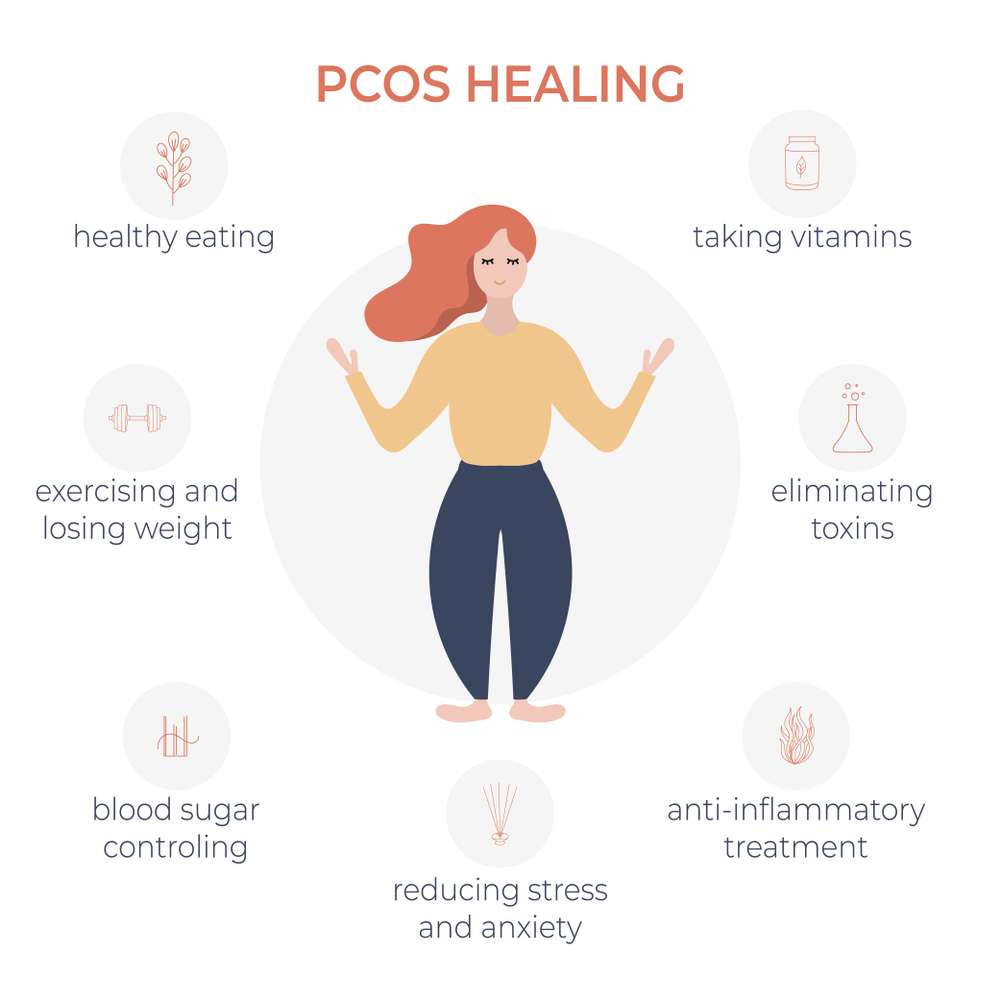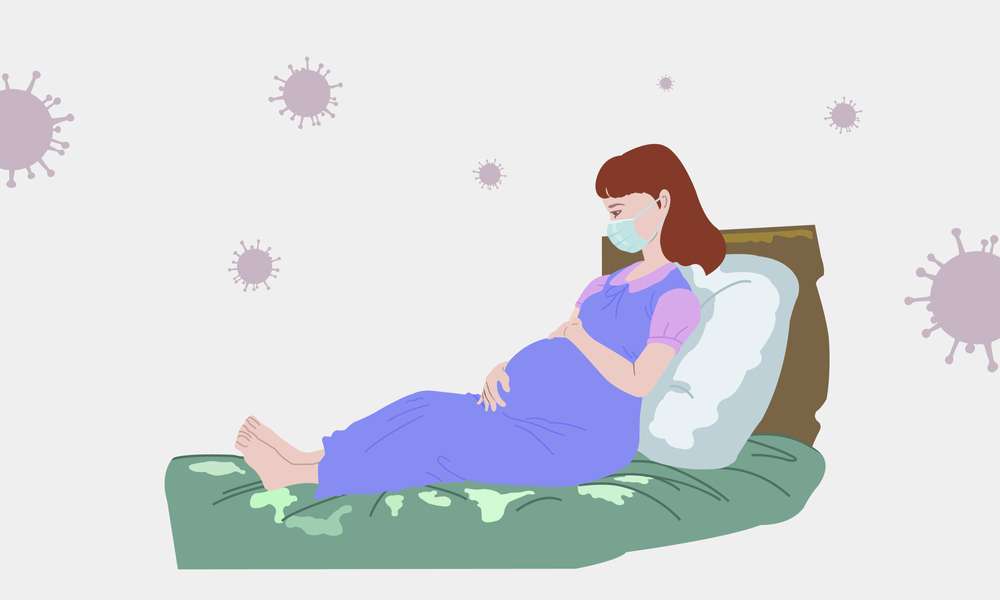PCOS
Introduction:
Polycystic ovarian syndrome, or PCOS, is a hormonal condition that affects millions of people worldwide. It is characterized by a hormonal imbalance in the reproductive system, which can lead to a variety of health problems. This article will go through the specifics of PCOS, such as its diagnosis, indicators, causes, symptoms, therapies, and impact on weight, food, and pregnancy.
What is PCOS?
PCOS, or polycystic ovarian syndrome, is a hormonal imbalance disorder that affects women. Women with PCOS frequently have an overproduction of androgens, a type of hormone occurring in lower amounts in females. This chemical imbalance impairs the ovaries’ regular release of eggs, resulting in irregular menstruation periods and probable reproductive issues. PCOS is a hormonal condition that primarily affects women of reproductive age. It is characterized by a hormonal imbalance that can cause a variety of symptoms and difficulties, such as irregular periods, reproductive issues, and the formation of cysts on the ovaries.
What are the first signs of PCOS?
Early detection of PCOS symptoms is critical for proper diagnosis and treatment. PCOS can cause a variety of symptoms, including irregular periods, heavy bleeding, acne breakouts, unwanted hair growth (hirsutism), hair thinning, weight gain, and mood swings. While these symptoms may differ from person to person, it is critical to get medical attention if you suspect PCOS based on these symptoms.
Irregular menstruation:
Period irregularity or absence is one of the most common early indications of PCOS. Women with PCOS may have longer or shorter menstrual cycles, or they may skip their periods entirely.
Excessive hair growth:
Excessive hair growth, often known as hirsutism, is another prevalent symptom of PCOS. This can happen to your face, chest, back, or other regions of your body.
Acne:
PCOS can also lead to persistent acne or exacerbate existing acne. This is due to the body’s elevated amounts of androgens (male hormones).
Weight gain:
Many PCOS women suffer with weight gain or have difficulties shedding weight. This is frequently associated with insulin resistance, a condition in which the body has trouble successfully utilising insulin to manage blood sugar levels.
Fatigue:
PCOS can also cause weariness or a lack of energy. This is due to the hormone abnormalities and interrupted sleep habits that are common with the illness.
What causes PCOS?
The actual cause of PCOS is unknown, however various variables are thought to have a role in its development. These are some examples:
- Hormonal Imbalance:PCOS is frequently characterized by high levels of insulin and androgens (male hormones) in the body. These abnormalities might affect the regular functioning of the ovaries and result in cyst formation.
- Hereditary factors: Because PCOS tends to run in families, there is evidence that it may have a hereditary component. More research, however, is required to completely understand the genetic influence on the development of PCOS.
- Insulin resistance: Insulin resistance, a disorder in which the body’s cells fail to respond effectively to insulin, is common in PCOS women. This can result in increased insulin synthesis and higher insulin levels in the circulation.
- Inflammation:Chronic low-grade inflammation has also been linked to the emergence of PCOS. Inflammation has been linked to insulin resistance and can affect normal hormone synthesis.
PCOS Symptoms:
PCOS symptoms can differ from woman to woman and may include:
- Period irregularity or lack of periods
- Hair growth on the face, chest, or other regions that is excessive (hirsutism)
- Oily or acne-prone skin
- Gaining weight or having difficulties decreasing weight
- Fatigue or a lack of energy
- Depression or mood swings
- Infertility or inability to conceive
PCOS belly:
Many women with PCOS may have abdominal weight gain, also known as a “PCOS belly,” which is characterized by extra fat around the waist. Insulin resistance and hormonal abnormalities are linked to this form of fat deposition. It might be difficult to lose a PCOS belly, but lifestyle changes such as a nutritious diet, frequent exercise, and stress management skills can help. It is critical to focus on total weight loss rather than targeting the belly area, as spot reduction is not viable.
PCOS treatments:
PCOS is managed with a mix of lifestyle adjustments, medication, and, in some cases, medical procedures. Some common PCOS treatments and therapies include:
- Modifications to your food and exercise habits can aid in hormone regulation and weight management. Adopting a low-glycemic index diet, engaging in regular physical activity, and maintaining a healthy body weight may be part of this.
- Medications: To regulate menstrual cycles and reduce testosterone levels, birth control pills or other hormonal contraceptives may be prescribed. Anti-androgen drugs can also be used to treat symptoms associated with excessive hair growth and acne.
- Fertility treatments: Women who are attempting to conceive may need help with ovulation induction or other fertility therapies. Medication such as clomiphene citrate or gonadotropins, as well as assisted reproductive technologies such as in vitro fertilization (IVF), can fall under this category.
- Surgery: In some circumstances, surgical treatments may be required to treat PCOS. Ovarian drilling, a laparoscopic operation that punctures the ovaries with a laser or heat, can help restore ovulation.
PCOS diet:
A healthy diet is essential for treating PCOS symptoms and improving overall health. Here are some food suggestions for PCOS women:
- Select complex carbohydrates: Choose whole grains over refined carbohydrates, such as brown rice and quinoa. These foods have a lower glycemic index and can aid with blood sugar regulation.
- Increase your fiber intake by include plenty of fruits, vegetables, legumes, and nuts in your diet. Fiber can help you feel fuller for extended periods of time and can aid digestion.
- Include lean proteins: Include lean protein sources in your meals, such as chicken, fish, tofu, or lentils. Protein can help you feel full and keep your blood sugar levels stable.
- Healthy fats: Choose healthy fats over saturated or trans fats, such as avocados, almonds, and olive oil. These fats help with hormone balancing and general heart health.
- Reduce additional sugars: Reduce your intake of sugary snacks, sweets, and beverages. These can cause blood sugar fluctuations and weight gain.
PCOS medication:
Medications may be administered to treat certain PCOS symptoms. These are some examples:
- Hormonal contraceptives can help regulate menstrual periods, lower testosterone levels, and manage acne and excessive hair growth.
- Anti-androgens: Medications like spironolactone or flutamide can be used to minimize the effects of androgens such hirsutism or acne.
- Metformin is a medicine that is often used to treat insulin resistance in PCOS patients. It aids in the regulation of blood sugar levels and may also aid in weight loss.
- Before beginning any medicine, it is critical to consult with a healthcare practitioner to confirm that it is appropriate for your unique needs.
PCOS Acne:
PCOS (polycystic ovarian syndrome) is a hormonal disease that can cause a number of symptoms, including acne. PCOS is characterized by sex hormone abnormalities, namely an excess of androgens (male hormones) in women. These hormonal imbalances can cause increased oil production in the skin, which can aggravate acne. Here are some important factors to remember concerning PCOS-related acne:
- Increased androgen levels: Women with PCOS frequently have increased amounts of androgens like testosterone. These hormones can stimulate the skin’s sebaceous (oil) glands, causing an overproduction of oil.
- Excess Sebum: The skin’s excess oil can clog hair follicles and pores. When these follicles get clogged, an environment for bacteria to thrive is created, resulting in irritation and the production of acne lesions.
- Acne Types: Acne in PCOS can appear in a variety of forms, including whiteheads, blackheads, papules, pustules, and cysts. It most commonly affects the face, but it can also affect other parts of the body such as the chest and back.
- Treatment: Acne caused by PCOS may necessitate a complex therapy. It is critical to treat the underlying hormonal imbalance in PCOS, which may need the use of medicine such as birth control pills, anti-androgens, or insulin-sensitizing medications. To control the skin problems, dermatological therapies such as topical creams, oral antibiotics, or other acne drugs may be prescribed.
- Skincare: Good skincare practices can aid in the management of acne in PCOS. Gentle cleaning to remove excess oil and germs, use of non-comedogenic (non-pore-clogging) skincare products, and avoidance of harsh scrubbing, which can irritate the skin and aggravate acne, are all part of this regimen.
- Diet and Lifestyle: Some people with PCOS find that making dietary and lifestyle adjustments will help them manage their acne. This may entail eating a well-balanced diet, regulating insulin resistance through dietary changes, and engaging in frequent exercise.
- Consultation with a Healthcare Provider: If you suspect you have PCOS or are suffering from acne as a result of PCOS, it is critical that you consult with a healthcare provider. They can do the appropriate tests to identify PCOS and provide a tailored treatment plan to address both the hormone imbalance and the acne.
PCOS Self-care:
Self-care is an important part of controlling polycystic ovarian syndrome (PCOS) because it can help reduce symptoms and enhance your overall well-being. Here are some self-care strategies for PCOS patients:
- Healthy Eating: A well-balanced diet is essential for PCOS management. Concentrate on whole foods such as fruits and vegetables, lean meats, whole grains, and healthy fats. Processed meals, sugary snacks, and beverages should be avoided because they might aggravate insulin resistance, which is frequent in PCOS.
- Exercise on a regular basis can help increase insulin sensitivity, regulate weight, and alleviate some PCOS symptoms. Aim for 150 minutes of moderate-intensity activity each week or 75 minutes of vigorous-intensity exercise.
- Stress Reduction: Chronic stress might exacerbate PCOS symptoms. Incorporate stress-reduction strategies such as mindfulness meditation, deep breathing exercises, yoga, or spending time in nature into your daily routine.
- Adequate Sleep: Make getting adequate sleep a priority, since poor sleep habits can contribute to hormone abnormalities. Aim for 7-9 hours of uninterrupted sleep per night.
- Hydration: Drink plenty of water throughout the day to stay hydrated. Hydration is important for general health and can help with metabolic function.
- Keep a record of your menstrual cycles, symptoms, and any changes in your PCOS symptoms. This information can be useful when discussing treatment options with your doctor.
- Learn everything you can about PCOS and how to handle it. Understanding the illness allows you to make more informed health decisions.
- Connect with a support system, whether it’s made up of friends, family, or support groups. Sharing experiences and receiving emotional support can be beneficial in dealing with PCOS.
- Check-ups on a regular basis: Schedule regular appointments with your doctor to monitor your PCOS and any associated issues, such as insulin resistance and cardiovascular health. Follow their screening and treatment recommendations.
- Medication Management: If your doctor provides medication to treat particular PCOS symptoms or underlying issues, take it as advised and report any adverse effects or concerns.Skin and Hair Care: If you have PCOS-related skin or hair concerns, create a skincare and haircare routine that works for you. Use gentle, non-comedogenic products and seek individualized guidance from a dermatologist.
- Hormone Balancing: Consult with your healthcare physician to determine the best hormonal management strategy for you. Birth control pills, anti-androgen medicines, or other hormonal therapy may be used.
How to lose weight with PCOS?
Due to the underlying hormonal imbalances and metabolic difficulties, losing weight can be difficult for women with PCOS. Losing weight with PCOS is difficult, but not impossible. Here are some strategies that may be useful:
- Concentrate on a well-balanced diet: Include a variety of fruits and vegetables, lean proteins, and healthy grains in your diet.
- Limit your intake of processed foods, sugary snacks, and sugary beverages.
- Exercise on a regular basis: Physical activity on a regular basis can help enhance metabolism, burn calories, and improve insulin sensitivity. Aim for at least 150 minutes per week of moderate-intensity aerobic activity.
- Meal preparation: Plan your meals ahead of time to minimize impulsive eating and overeating. Because PCOS is frequently associated with insulin resistance and weight gain, portion control is critical.
- Seek professional advice: Speak with a PCOS-specific qualified dietitian or nutritionist. They can assist you in developing a specific eating plan and attaining your weight loss objectives.
PCOS and Pregnancy:
PCOS can make it difficult for women attempting to conceive, but it does not necessarily mean that pregnancy is impossible. Many women with PCOS can successfully conceive and have healthy pregnancies with the right medical assistance and medication. To improve fertility, assisted reproductive technologies such as in vitro fertilization (IVF) or drugs such as clomiphene citrate may be used. It is critical to collaborate closely with a reproductive medicine specialist to determine the best options for obtaining a successful pregnancy.
Metformin for PCOS:
Metformin, a drug routinely used to treat insulin resistance in type 2 diabetes, has also showed potential in treating PCOS symptoms. Metformin can improve menstrual regularity and ovulation by increasing insulin sensitivity and controlling hormonal imbalances. Individual responses to metformin, however, may vary, and contact with a healthcare expert is required to identify the optimal dosage and suitability for each person.
How to cure pcos permanently?
Polycystic ovarian syndrome (PCOS) is a chronic illness with no known cure. It can, however, be effectively treated with a mix of lifestyle adjustments and medical therapies. The purpose of PCOS management is to relieve symptoms, enhance hormonal balance, and lower the risk of related health problems. Here are some PCOS management actions you can take:
- Consult a Healthcare professional: If you suspect or have been diagnosed with PCOS, the first step is to see a healthcare professional, preferably a gynecologist or endocrinologist who specializes in hormonal problems. They can perform the appropriate tests and exams to confirm the diagnosis and develop a customized treatment strategy.
Changes in Lifestyle:
- Adopt a balanced diet rich in nutritious foods, lean proteins, fiber, and healthy fats. Limit your intake of processed foods, sweets, and refined carbohydrates.
- Exercise on a regular basis to enhance insulin sensitivity and aid with weight management. Aim for at least 150 minutes per week of moderate-intensity exercise.
- Stress Management: To assist manage hormone imbalances, use stress-reduction techniques such as meditation, yoga, deep breathing exercises, or mindfulness.
- Adequate Sleep: Make obtaining enough quality sleep a priority, since poor sleep habits can exacerbate PCOS symptoms.
- Hydration: Drink plenty of water throughout the day to stay hydrated.
- drugs: Your healthcare practitioner may recommend drugs to control PCOS based on your unique symptoms and health concerns. These could include:
- Oral contraceptives can help regulate menstrual periods and alleviate symptoms such as acne and hirsutism (excessive hair growth).
- Anti-Androgen Drugs: These medications can help lessen symptoms associated with excess androgens, such as hirsutism and acne.
- Metformin: Metformin, which is commonly used in cases of insulin resistance, can help increase insulin sensitivity and regulate menstrual periods.
Conclusion:
PCOS can have a substantial impact on a woman’s physical and mental well-being. Understanding the disease and finding proper treatment, on the other hand, might help control the symptoms efficiently. If you suspect you have PCOS or are experiencing any of the related symptoms, you should see a doctor for an accurate diagnosis and specific treatment plan. Remember that you are not alone, and that with the correct help, PCOS may be efficiently treated, allowing you to live a full life.





